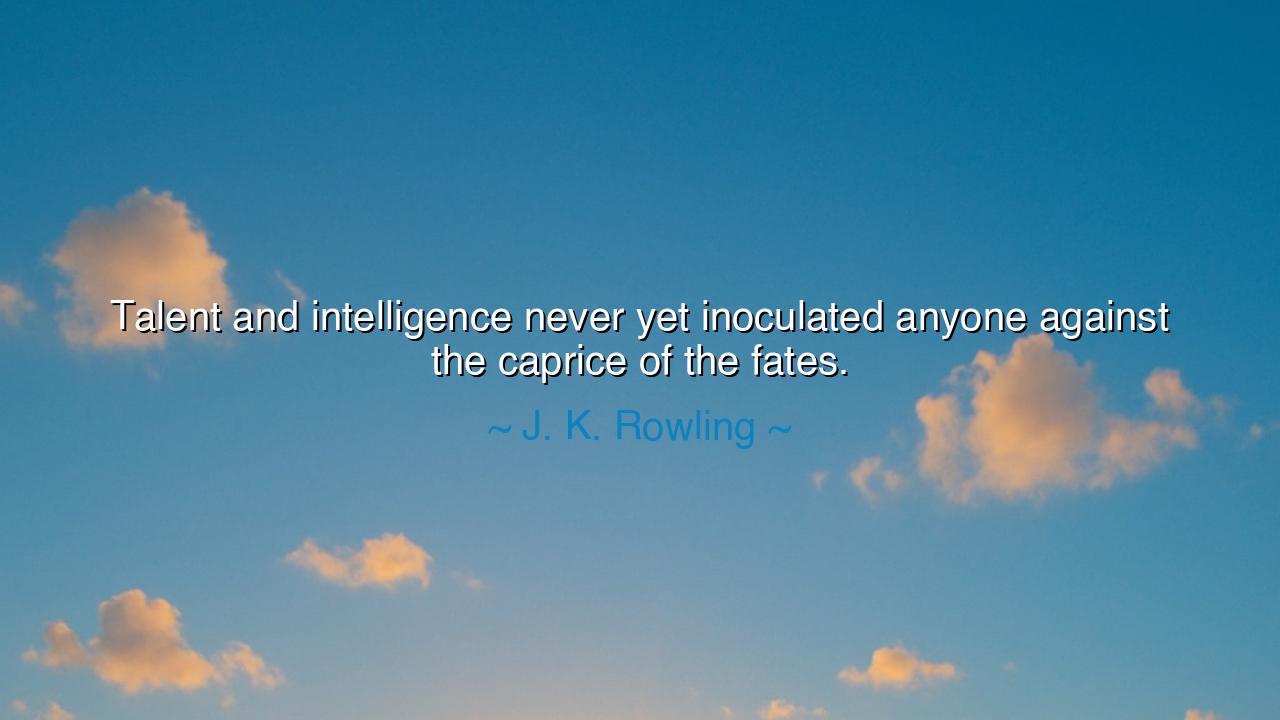
Talent and intelligence never yet inoculated anyone against the






In these timeless and sobering words, J. K. Rowling reminds us of a truth as old as destiny itself: “Talent and intelligence never yet inoculated anyone against the caprice of the fates.” Beneath her eloquence lies a lesson both humbling and profound — that no matter how gifted or clever we may be, we are never beyond the reach of fortune’s whim. Life, unpredictable and vast, does not bend to human mastery. The wise, the skilled, the brilliant — all must still walk the same uncertain road, where chance and change reign as silent kings. Rowling speaks here as one who has known both the sweetness of triumph and the sting of adversity, a voice tempered by both magic and reality.
The origin of these words comes not from fantasy but from experience. Before the world knew her as the creator of Harry Potter, Rowling knew hardship deeply — rejection, poverty, and despair. She wrote her masterpiece not from comfort but from the edge of survival. And even after her fame, she saw that success offers no shield against sorrow or loss. Her insight is ancient in spirit, echoing through centuries of human reflection: that fate is fickle, and the wheel of life turns without warning. The Greeks named this truth Tyche, the goddess of fortune, whose hand could lift one man to glory and cast another into ruin. Even the mightiest heroes — Achilles, Oedipus, Caesar — fell before the unseen tide of destiny.
Rowling’s warning, though grave, is not meant to bring despair, but humility. For in a world that worships talent and intellect as the highest powers, she reminds us that these alone do not secure happiness or safety. The caprice of the fates — the unpredictable winds of time and circumstance — touches every life, from peasant to poet, from genius to fool. A brilliant mind may foresee a thousand outcomes, yet still stumble upon the one it could not imagine. A gifted hand may shape wonders, yet tremble before loss. To understand this is not to surrender, but to awaken — to live not in arrogance, but in awe of the mystery that governs all things.
History offers countless mirrors to this truth. Alan Turing, one of the greatest minds of the modern age, broke the Nazi Enigma code and helped to save millions of lives. His intelligence reshaped the future of humanity, giving birth to the age of computing. Yet, despite his brilliance, fate dealt him cruelty. Persecuted for his identity, he was silenced by the very society he had protected. His tragedy reveals the essence of Rowling’s words: no mind, however bright, can command the world’s mercy. Fate moves beyond reason. The wise do not rail against this, but learn to walk with grace through its shadows.
And yet, within this acceptance lies strength, not weakness. For when we realize that we are not masters of destiny, we learn to master ourselves. We discover the quiet power of resilience — the ability to rise again after the fall, to rebuild what fate has undone. Talent may not shield us, but character sustains us. Intelligence may not save us, but courage renews us. This is the wisdom of the ancients: that while fortune may command the stage, the soul remains free to choose how it will stand before her storms.
Rowling’s quote also carries a subtle defiance — an understanding that though the fates are capricious, we are not powerless. The universe may be unpredictable, but our response to it defines who we are. The poet may lose his sight, yet still write of stars; the scholar may face ruin, yet still teach truth; the wanderer may be cast adrift, yet still find meaning in the waves. To live nobly is not to escape misfortune, but to endure it without bitterness. The fates may strike, but the human heart — unbroken, unbowed — can still create beauty from sorrow.
So, my child, take this truth as both shield and torch: do not mistake talent for destiny, nor intellect for immunity. The fates are not cruel; they are simply beyond our understanding. One day they may bless you, another they may test you. But in both, there is wisdom. Cultivate your gifts, yes — but more than that, cultivate your grace. Meet triumph with gratitude, and tragedy with patience. Remember always that the same winds that scatter can also carry. And when fortune turns her gaze away, let not despair consume you, for it is often in the darkest hour that the soul’s greatest light is revealed.
For as J. K. Rowling knew — as every sage before her knew — the fates cannot be tamed, but they can be faced with dignity. And in that courage, in that quiet endurance, there lies a power greater than talent, greater than intelligence, greater even than luck: the power to live meaningfully in a world that owes no guarantees, and to love life still, despite its caprice.






AAdministratorAdministrator
Welcome, honored guests. Please leave a comment, we will respond soon